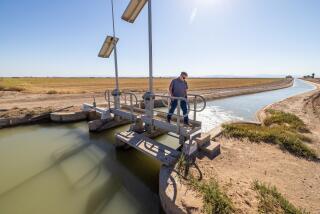Irrigation District Sues to Keep Share of River Water
SAN DIEGO — The Imperial Irrigation District on Friday filed a lawsuit in federal court to block the Bush administration from cutting water allocations from the Colorado River to Imperial Valley farmers.
The administration took the action after negotiations broke down over a proposed deal to shift water from desert farms to urban San Diego. The transfer would have helped reduce California’s take from the river, an amount that exceeds the legal limit.
The lawsuit accuses the federal government of “egregious disregard of the law” with an act that could cripple agriculture and “severely injure” a community that already is one of the poorest in California and is dependent on Colorado River water to sustain its economy.
Assistant Interior Secretary Bennett Raley announced on Dec. 27 that the Imperial district’s allocation would be cut by 7% if a Dec. 31 deadline for a deal among the irrigation district, the San Diego County Water Authority, the Metropolitan Water District of Southern California and the Coachella Valley Water District was not met.
The deal stalled in the final hours of last year as the irrigation district and the San Diego authority added conditions that the MWD found unacceptable and Coachella said it did not have adequate time to study.
The conditions, among other things, involved financial protection for the irrigation district against being billed for “fixing” the Salton Sea, which survives on agricultural runoff from Imperial Valley and could be damaged if the farmers begin using less water on their crops.
Filed by the firms of Allen, Matkins, Leck, Gamble & Mallory in San Diego and Horton, Knox, Carter & Foote in El Centro, the lawsuit seeks to block the Bureau of Reclamation, which controls Colorado River allocations, from following through on the order issued by Raley and his boss, Interior Secretary Gale Norton.
“This is not unexpected,” Raley said of the lawsuit, “and we are fully prepared for a court challenge.”
The irrigation district also faces a political battle in Sacramento. Earlier this week, two state senators threatened to introduce a bill to further cut the irrigation district’s allocation.
This is not the first time the district has fought the federal government in court to protect its right to siphon water from the Colorado River. In the 1980s, the U.S. Supreme Court overturned a regulation that would have restricted water use to farms of 160 or fewer acres.
The district’s rights stem from actions taken a century ago by valley pioneers who began diverting Colorado River water.
Raley said authority for the 7% reduction comes from a 1979 decree that enforced a 1964 U.S. Supreme Court decision backing Arizona in a water fight with California. Raley said the decree provides per-acre limits that the Imperial Irrigation District has been violating.
But Imperial lawyers disagree with Raley’s interpretation of the 1979 decree. The district asserts that it is entitled to upward of 75% of the state’s allocation from the Colorado River.
What also galls Imperial Valley officials and farmers is the fact that much of the water would be reallocated to the Metropolitan Water District. The cut would deny Imperial about 200,000 acre-feet of water -- enough for about 30,000 acres of farmland. Reallocated to Metropolitan, it would serve about 1.6 million urban customers.
California has been under increasing pressure from the federal government and other states that depend on the Colorado River to reduce its overuse of the river.
When the agencies could not meet the Dec. 31 deadline, Raley ordered the 7% cut for the irrigation district and a nearly 50% cut for MWD, which serves 17 million people in six counties. The MWD has other ways to compensate for the cut, including reservoirs, aquifers, conservation plans, and deals with Northern California farmers to sell water. The Imperial Valley farmers have no such resources.
More to Read
Sign up for Essential California
The most important California stories and recommendations in your inbox every morning.
You may occasionally receive promotional content from the Los Angeles Times.










